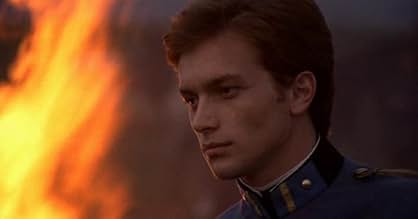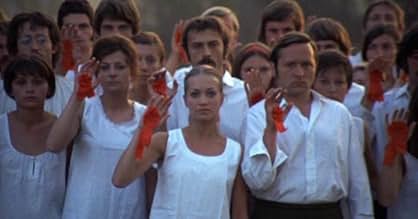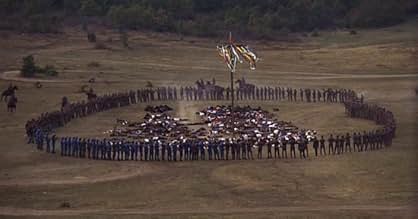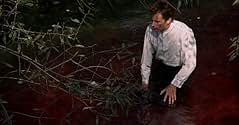AVALIAÇÃO DA IMDb
6,7/10
2 mil
SUA AVALIAÇÃO
Adicionar um enredo no seu idiomaSet in the 1890s on the Hungarian plains, a group of farm workers go on strike in-which they face harsh reprisals and the reality of revolt, oppression, morality and violence.Set in the 1890s on the Hungarian plains, a group of farm workers go on strike in-which they face harsh reprisals and the reality of revolt, oppression, morality and violence.Set in the 1890s on the Hungarian plains, a group of farm workers go on strike in-which they face harsh reprisals and the reality of revolt, oppression, morality and violence.
- Prêmios
- 1 vitória e 2 indicações no total
Enredo
Você sabia?
- CuriosidadesIncluded among the "1001 Movies You Must See Before You Die", edited by Steven Schneider.
Avaliação em destaque
Note: This review was written in 2004.
Jancso's famous poetic film that was so much debated in our overly-politicized youth when it first appeared. A work flooded with music and singing, a continuous choreography-hymn to the revolution that wins the viewer overcoming rational resistance. Of course, the film is viewed very differently now in the years of a single world superpower than thirty years ago in the years of fermentation and hope. There is now a widespread disappointment about the film's issues, a skepticism about what it claims, and its optimistic finale is rather received with a sigh ...
The issue of the rebellion of oppressed peasants seems to belong to a very distant past, and the historical victory of the "people," where it happened anyway, did not evolve as its prophets dreamed of. It is also remarkable that the film seems to support a non-Soviet version of the revolution, where, as its leader states, "the land belongs only to those who cultivate it", meaning of course that it does not belong to the landowners - neither to the State, we conclude!
Also noteworthy are the religious connotations that (inevitably?) the revolutionaries give to their actions: after resisting the priests, as collaborators of Power, and after burning a church in a choreographic way, they set their own ritual: a People's "Sunday Prayer" a "confession and repentance" of the deceived villager who collaborated with the authorities and returns to the "People", a pagan funeral, etc. Obviously, at the time of the film (1972), all of these were part of the communist practice that tried to uproot the faith of the simple people, but also needed to devise ritualistic substitutes. Today, they are viewed as just another failed anti-Christian effort of a rigid ideological system.
Overall, Jancso's film is an enviable achievement of poetic cinema, where human characters are absent, since every person appearing is nothing more than a "bearer of ideology and history". With the continuous movement of the camera, the complete absence of interior scenes (the entire, absolutely entire, movie is filmed outdoors, in the endless Hungarian plain), music and dance, it captivates the viewer, apparently showing the way to directors who followed, like Bertolucci and Angelopoulos. Unfortunately the passing of time left its mark on the film copy and all its wonderful colors have degraded to a monochrome brownish. A film certainly worth the 1972 Cannes Film Prize.
Overall, Jancso's film is an enviable achievement of poetic cinema, where human characters are absent, since every person appearing is nothing more than a "bearer of ideology and history". With the continuous movement of the camera, the complete absence of interior scenes (the entire, absolutely entire, movie is filmed outdoors, in the endless Hungarian plain), music and dance, it captivates the viewer, apparently showing the way to directors who followed, like Bertolucci and Angelopoulos. Unfortunately the passing of time left its mark on the film copy and all its wonderful colors have degraded to a monochrome brownish. A film certainly worth the 1972 Cannes Film Prize.
- Tasos2
- 11 de jun. de 2019
- Link permanente
Principais escolhas
Faça login para avaliar e ver a lista de recomendações personalizadas
- How long is Red Psalm?Fornecido pela Alexa
Detalhes
- Tempo de duração1 hora 27 minutos
- Mixagem de som
- Proporção
- 1.37 : 1
Contribua para esta página
Sugerir uma alteração ou adicionar conteúdo ausente

Principal brecha
By what name was Salmo Vermelho (1972) officially released in Canada in English?
Responda




















